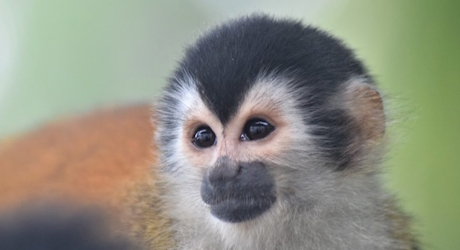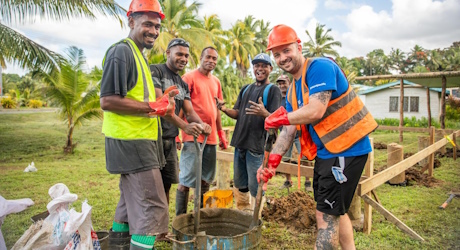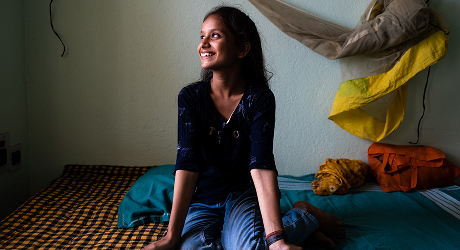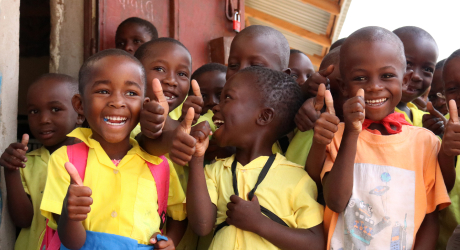Footprints Project
Since 2005, travelers like you have helped us change the world through micro-donations.
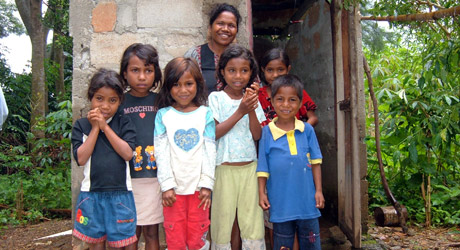
-
A total of
12823
Travelers
-
donated
$31552.35
(100% funded) -
to help improve
Water & Sanitation
-
in
Timor-Leste
The WaterAid Australia program in Kamalvouru had three key objectives;
Objective 1: To improve access to safe water for 157 people living in Kamalvouru village.
- The aims for this component of the project have been fulfilled. All 26 households now have vastly improved, reliable access to safe water through 5 conveniently situated public taps.
- Women and children no longer walk long distances to collect water, nor do they bear heavy loads to do so.
- Children in the village are bathing more regularly and as such their personal hygiene is greatly improved.
- Women are spending more time at home with their families, farming and properly caring for their children.
- Young girls have saved time previously spent collecting water – allowing them time to attend school, drastically reducing truancy and dropouts.
Objective 2: To improve access to effective sanitation and hygiene behaviours for 157 people living in Kamalvouru village
- The aims for this component of the project have been fulfilled. 26 households now have access to latrines. This means 100% sanitation coverage for this village.
- The new facilities have been complimented with hygiene messages received by the entire community.
- The residents of Kamalvouru are practicing improved hygiene behaviour such as hand washing and domestic cleaning. All community members are using the new latrines.
- School children are having fun with class ”role-play” in order to disseminate improved hygiene behaviour.
Objective 3: To improve the capacity of communities and local organisations to mobilise skills in order to manage and maintain the facilities and associated improved hygiene behaviours.
- Community representatives (known as Project Management Committees or “Groupu Manage Facilidade” in the local language, Tetum) have been trained in project management, maintenance skills, system operations and fund collection.
- Many of these PMC’s continue to regularly contribute their own money towards the community-managed fund for repairs and maintenance of the system they have built.
- A local hygiene promoter continues to visit each household on rotational basis to talk with families, reinforcing the hygiene messages and encouraging them to practice improved hygiene habits on a regular basis.

Residents of Kamalvouru undertook all project construction. Here they are pictured building the reservoir for one of the five village tap stands
Outcomes: Positive Change for Hundreds
1. The community has an increased confidence in demanding better quality of life for their people and have begun to invite and seek assistance from visiting government officials.
2. The relevant Timor-Leste government departments have begun to acknowledge the importance of integrated water, sanitation and hygiene promotion for lasting behaviour change and improved health for people living in Liquica. This “buy-in” has begun to evolve into reformed practices within government and will lead to broader implementation of effective water, sanitation and hygiene education projects.
3. WaterAid Australia will continue to have a strong presence in lobbying government, as we advocate heavily for an effective solution for the people of Timor Leste.
Note: A local health clinic in Maubara sub District (where all WaterAid projects have been to date) has indicated a 24% drop in diarrhoea cases from 2007 to 2008. This is not considered to be conclusive but may be a corroboration of the impacts that WaterAid supported activities may be having in the district.
Building Capacity of the local Community
This project has contributed to the increased capacity of the local community as well as the local NGO partner, HTL in Kamalvouru. WaterAid Australia staff continued to mentor staff from HTL throughout the project period and as a result have enhanced their technical capacity in implementing water, sanitation and hygiene programs.
Staff from HTL and WaterAid Australia helped “project management committees” to plan, implement, operate and mange their own water and sanitation projects. WaterAid Australia continues to provide follow-up support to the committees for at least two years after the technical elements were completed, to ensure the PMC takes on all operational responsibilities for the project.
WaterAid Australia has also organised workshops, which include several different Project Management Committees, facilitating discussion and sharing of useful experiences between representatives from surrounding villages.
Plans for the future
WaterAid is well aware that long term sustainability is difficult to achieve in projects in developing countries. In Timor-Leste it is official government policy that each village community is responsible for the ongoing operation and maintenance of water and sanitation facilities. The proscribed mechanism is that village GMF committees.
The project in Kamalvouru will be sustained well into the future. As the village is situated in a remote part of Timor-Leste, the community have a real desire for improved water and sanitation facilities and an investment in maintaining these. The community also continues to display enthusism towards the developments, with a strong leadership and active PMC to take these facilities into the furture.
In order to maintain momentum and enthusiasm for the project (and subsequent utilisation), WaterAid Australia will continue to visit and provide “hands on” support to the residents of Kamalvouru for two years. Currently, the communities are receiving support in the following areas:
- Collection of maintenance funding
- technical advice relating to various technical problems in the hardware of the water systems
- Information and contacts for sourcing spare parts for repair of the water system.
WaterAid Australia established strong links with other donors and Aid organisations who are working to meet other other development needs of the residents of Kamalvouru, such as small scale agriculture and micro-economies. The confidence that the communities developed having successfully completed their water and sanitation project continues to motivate them to aspire to great improvements. The residents of Kamalvouru have lobbied for other development activities in their region. WaterAid Australia will continue to capitalize on this fantastic community energy during the next two years of follow up.
However it is well recognised that village GMF committees need some external support, particularly access to higher level skills and spare parts, for serious repairs to be effected. There is not yet any clear national system of support to GMF’s.
A variety of mechanisms are being used in other countries, including support form local government technical departments, local NGOs and private enterprise. There is currently a considerable amount of external advice (from AusAID and USAID in particular) being received by the government in Timor-Leste about which system to adopt, the results of which should be decided in the next year. Until this is clarified WaterAid has decided to employ a “boundary rider”, who will be on call and visit each GMF at least once every 6 months over the next 2 year period to provide ongoing support and enhance the sustainability of the project benefits.
Lessons learned
- The quality of toilets in remote areas continues to be less than those built in accessible locations. As basic materials (cement and rebars) are more easily obtained and transported to the villages based closer to the road, the cost of these “accessible” toilets is less. WaterAid will continue to work with remote communities to ensure that this gap in access to sanitation can be reduced.
- Additionally, communities living nearer to the road usually enjoy better services and living conditions than those living in remote locations – as such, they can afford to pay for toilets and facilities of better quality.
- Communities are expected to take responsibility for operation and maintenance of their water and sanitation facilities. However community management is a new concept in Timor and to achieve this objective, long-term support needs to be provided to the community.
- To achieve effective participation, the activity planning should be in line with their other livelihood activities, such as crop planting, weeding and harvesting times.
- The evaluation method of asking people about hand washing tests “knowledge” rather than “practice”. Some more observational studies will be trialled in future to ascertain if long-term adoption of hand washing at critical times is actually being achieved. However it is difficult to achieve long tem adoption on a project basis. Usually long-term national hygiene promotion campaigns are required to effectively reinforce and maintain behaviour changes. WaterAid will look at using local community radio as one way of reinforcing these hygiene messages.
- Current government and private sector capacity is low and WaterAid will look at ways to support their capacity development

One of the 26 new latrines being used by the people of Kamalvouru
Traveling soon? When you buy travel insurance with us, you can make a contribution towards a cause you care about.
Get a quote